An Analysis of Airbnb's Influence on Singapore's Hotel Industry
VerifiedAdded on 2022/10/06
|17
|5394
|18
Essay
AI Summary
This essay investigates the significant impact of Airbnb on Singapore's budget hotel industry. It begins by providing an overview of Singapore's tourism and hospitality sector, highlighting the growing influence of peer-to-peer platforms like Airbnb. The essay then delves into Airbnb's business model, its rapid growth, and its effects on the hotel industry, including revenue stagnation and increased competition. It explores the challenges faced by traditional hotels, such as short-term rental restrictions and issues related to host-guest interactions. The analysis covers the legal and economic implications of Airbnb in Singapore, including its impact on the hotel industry's revenue and market dynamics. The essay also discusses the strategies that hotels are adopting to cope with challenges posed by Airbnb. The essay also includes discussion on the limitations of Airbnb, including pricing and property legality issues, and its broader effects on the tourism landscape. The essay concludes with recommendations for hotels to maintain a competitive advantage in the market.
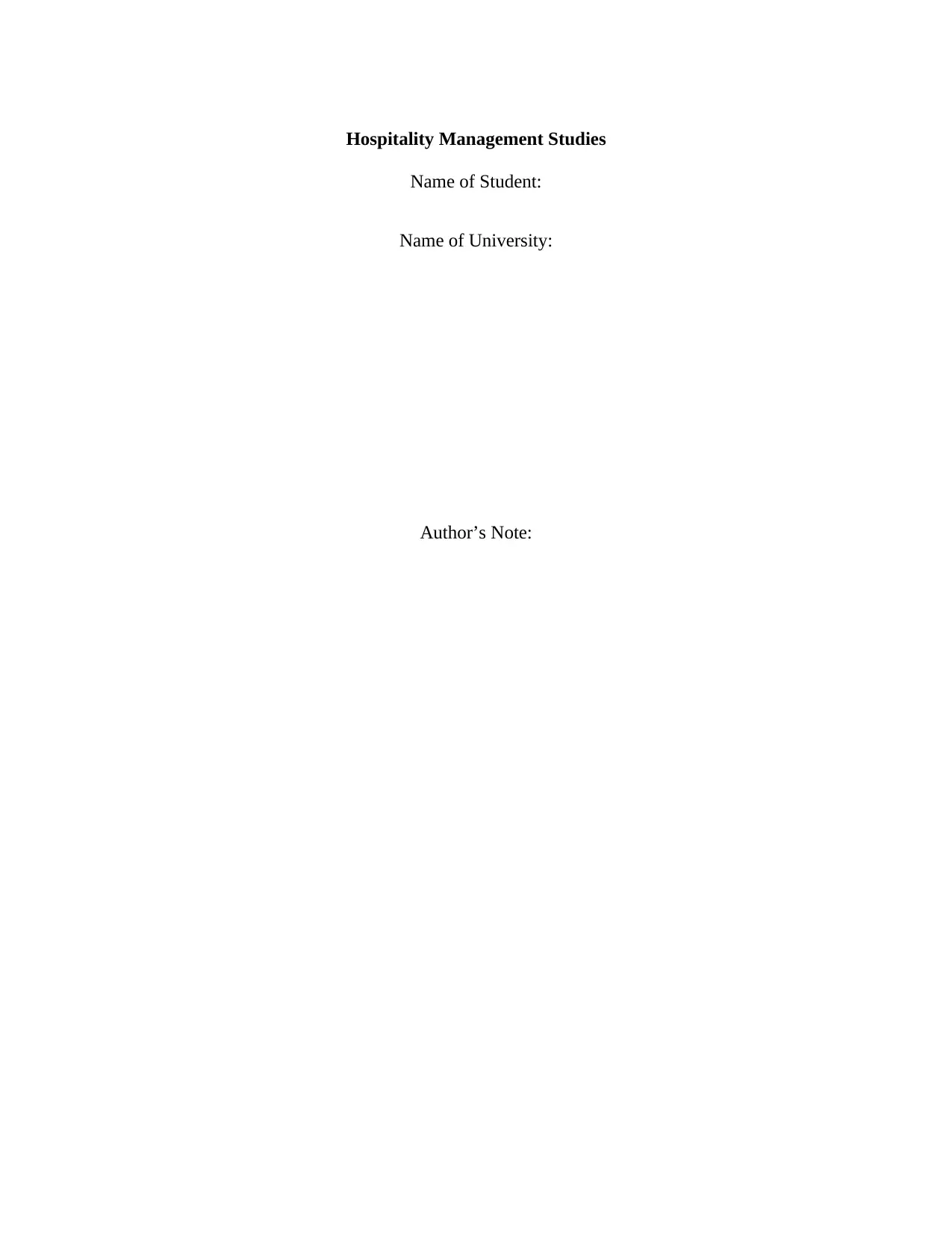
Hospitality Management Studies
Name of Student:
Name of University:
Author’s Note:
Name of Student:
Name of University:
Author’s Note:
Paraphrase This Document
Need a fresh take? Get an instant paraphrase of this document with our AI Paraphraser
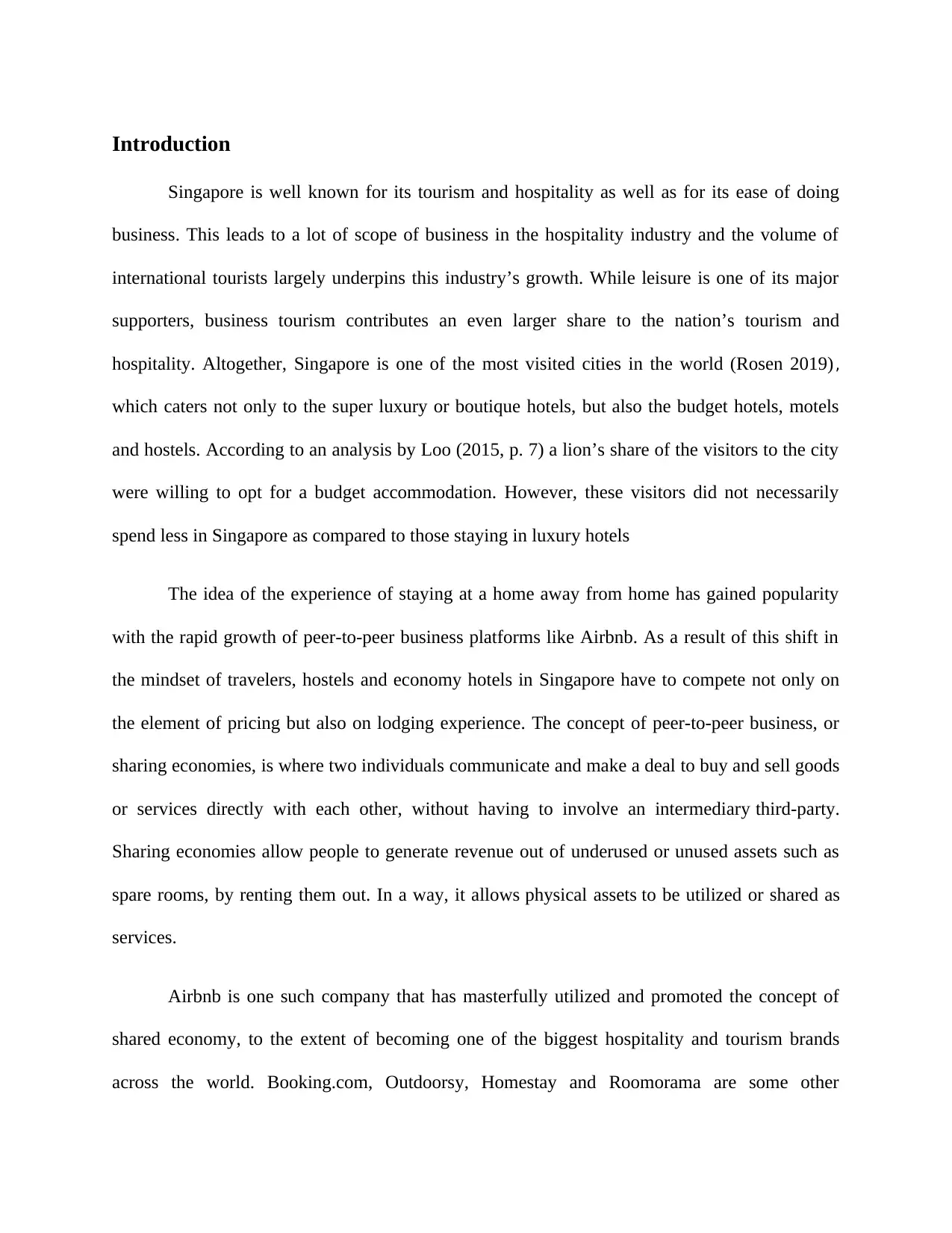
Introduction
Singapore is well known for its tourism and hospitality as well as for its ease of doing
business. This leads to a lot of scope of business in the hospitality industry and the volume of
international tourists largely underpins this industry’s growth. While leisure is one of its major
supporters, business tourism contributes an even larger share to the nation’s tourism and
hospitality. Altogether, Singapore is one of the most visited cities in the world (Rosen 2019),
which caters not only to the super luxury or boutique hotels, but also the budget hotels, motels
and hostels. According to an analysis by Loo (2015, p. 7) a lion’s share of the visitors to the city
were willing to opt for a budget accommodation. However, these visitors did not necessarily
spend less in Singapore as compared to those staying in luxury hotels
The idea of the experience of staying at a home away from home has gained popularity
with the rapid growth of peer-to-peer business platforms like Airbnb. As a result of this shift in
the mindset of travelers, hostels and economy hotels in Singapore have to compete not only on
the element of pricing but also on lodging experience. The concept of peer-to-peer business, or
sharing economies, is where two individuals communicate and make a deal to buy and sell goods
or services directly with each other, without having to involve an intermediary third-party.
Sharing economies allow people to generate revenue out of underused or unused assets such as
spare rooms, by renting them out. In a way, it allows physical assets to be utilized or shared as
services.
Airbnb is one such company that has masterfully utilized and promoted the concept of
shared economy, to the extent of becoming one of the biggest hospitality and tourism brands
across the world. Booking.com, Outdoorsy, Homestay and Roomorama are some other
Singapore is well known for its tourism and hospitality as well as for its ease of doing
business. This leads to a lot of scope of business in the hospitality industry and the volume of
international tourists largely underpins this industry’s growth. While leisure is one of its major
supporters, business tourism contributes an even larger share to the nation’s tourism and
hospitality. Altogether, Singapore is one of the most visited cities in the world (Rosen 2019),
which caters not only to the super luxury or boutique hotels, but also the budget hotels, motels
and hostels. According to an analysis by Loo (2015, p. 7) a lion’s share of the visitors to the city
were willing to opt for a budget accommodation. However, these visitors did not necessarily
spend less in Singapore as compared to those staying in luxury hotels
The idea of the experience of staying at a home away from home has gained popularity
with the rapid growth of peer-to-peer business platforms like Airbnb. As a result of this shift in
the mindset of travelers, hostels and economy hotels in Singapore have to compete not only on
the element of pricing but also on lodging experience. The concept of peer-to-peer business, or
sharing economies, is where two individuals communicate and make a deal to buy and sell goods
or services directly with each other, without having to involve an intermediary third-party.
Sharing economies allow people to generate revenue out of underused or unused assets such as
spare rooms, by renting them out. In a way, it allows physical assets to be utilized or shared as
services.
Airbnb is one such company that has masterfully utilized and promoted the concept of
shared economy, to the extent of becoming one of the biggest hospitality and tourism brands
across the world. Booking.com, Outdoorsy, Homestay and Roomorama are some other
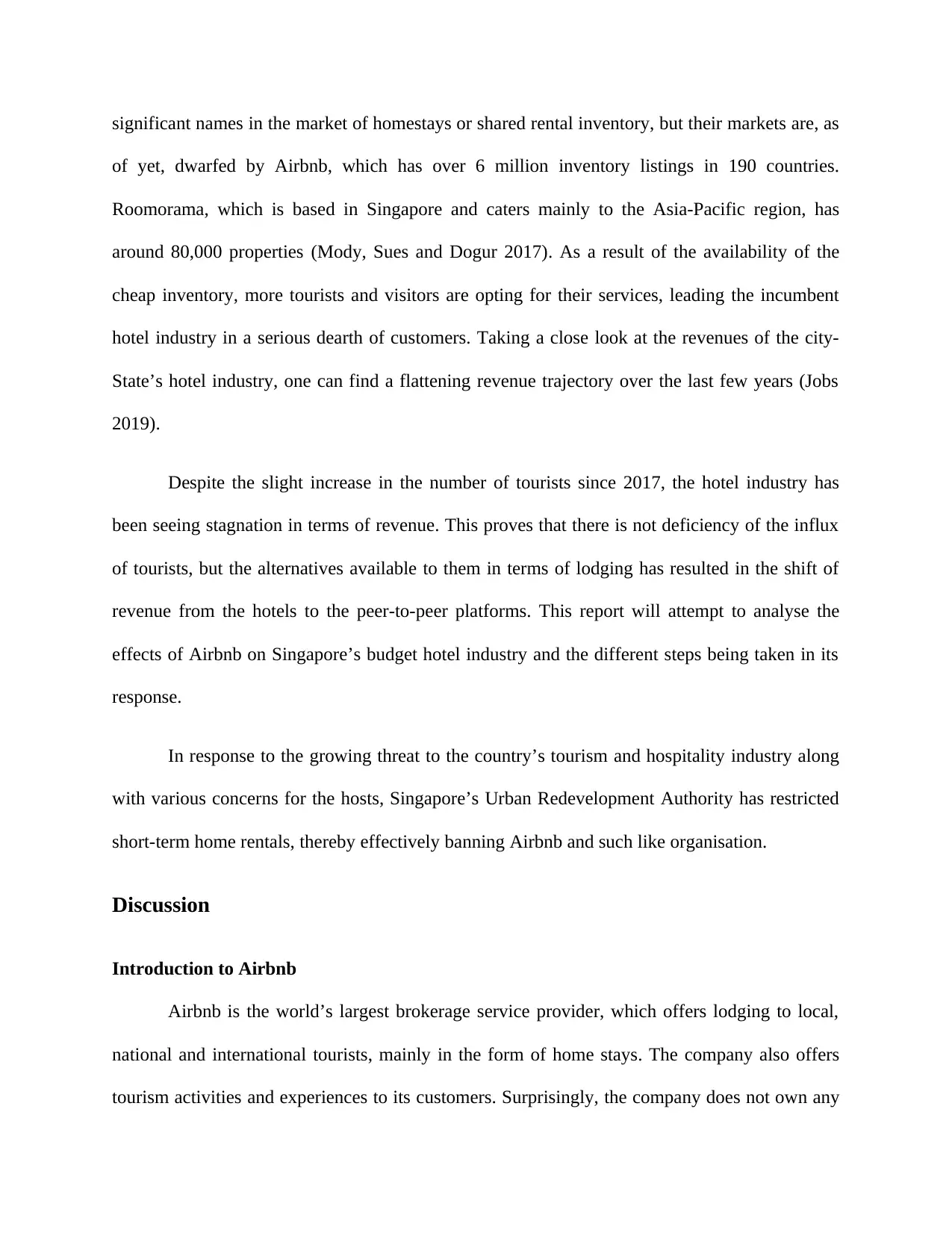
significant names in the market of homestays or shared rental inventory, but their markets are, as
of yet, dwarfed by Airbnb, which has over 6 million inventory listings in 190 countries.
Roomorama, which is based in Singapore and caters mainly to the Asia-Pacific region, has
around 80,000 properties (Mody, Sues and Dogur 2017). As a result of the availability of the
cheap inventory, more tourists and visitors are opting for their services, leading the incumbent
hotel industry in a serious dearth of customers. Taking a close look at the revenues of the city-
State’s hotel industry, one can find a flattening revenue trajectory over the last few years (Jobs
2019).
Despite the slight increase in the number of tourists since 2017, the hotel industry has
been seeing stagnation in terms of revenue. This proves that there is not deficiency of the influx
of tourists, but the alternatives available to them in terms of lodging has resulted in the shift of
revenue from the hotels to the peer-to-peer platforms. This report will attempt to analyse the
effects of Airbnb on Singapore’s budget hotel industry and the different steps being taken in its
response.
In response to the growing threat to the country’s tourism and hospitality industry along
with various concerns for the hosts, Singapore’s Urban Redevelopment Authority has restricted
short-term home rentals, thereby effectively banning Airbnb and such like organisation.
Discussion
Introduction to Airbnb
Airbnb is the world’s largest brokerage service provider, which offers lodging to local,
national and international tourists, mainly in the form of home stays. The company also offers
tourism activities and experiences to its customers. Surprisingly, the company does not own any
of yet, dwarfed by Airbnb, which has over 6 million inventory listings in 190 countries.
Roomorama, which is based in Singapore and caters mainly to the Asia-Pacific region, has
around 80,000 properties (Mody, Sues and Dogur 2017). As a result of the availability of the
cheap inventory, more tourists and visitors are opting for their services, leading the incumbent
hotel industry in a serious dearth of customers. Taking a close look at the revenues of the city-
State’s hotel industry, one can find a flattening revenue trajectory over the last few years (Jobs
2019).
Despite the slight increase in the number of tourists since 2017, the hotel industry has
been seeing stagnation in terms of revenue. This proves that there is not deficiency of the influx
of tourists, but the alternatives available to them in terms of lodging has resulted in the shift of
revenue from the hotels to the peer-to-peer platforms. This report will attempt to analyse the
effects of Airbnb on Singapore’s budget hotel industry and the different steps being taken in its
response.
In response to the growing threat to the country’s tourism and hospitality industry along
with various concerns for the hosts, Singapore’s Urban Redevelopment Authority has restricted
short-term home rentals, thereby effectively banning Airbnb and such like organisation.
Discussion
Introduction to Airbnb
Airbnb is the world’s largest brokerage service provider, which offers lodging to local,
national and international tourists, mainly in the form of home stays. The company also offers
tourism activities and experiences to its customers. Surprisingly, the company does not own any
⊘ This is a preview!⊘
Do you want full access?
Subscribe today to unlock all pages.

Trusted by 1+ million students worldwide
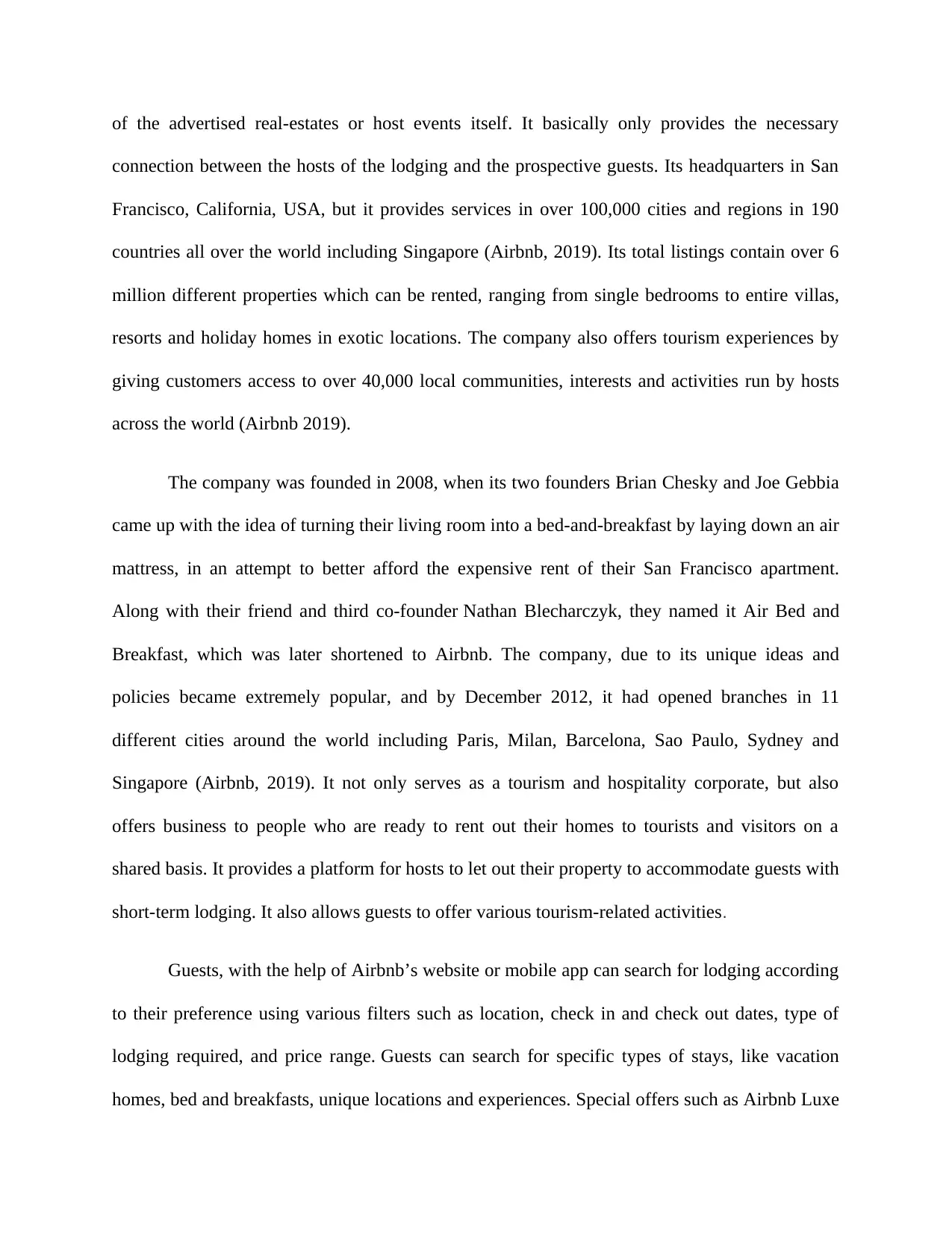
of the advertised real-estates or host events itself. It basically only provides the necessary
connection between the hosts of the lodging and the prospective guests. Its headquarters in San
Francisco, California, USA, but it provides services in over 100,000 cities and regions in 190
countries all over the world including Singapore (Airbnb, 2019). Its total listings contain over 6
million different properties which can be rented, ranging from single bedrooms to entire villas,
resorts and holiday homes in exotic locations. The company also offers tourism experiences by
giving customers access to over 40,000 local communities, interests and activities run by hosts
across the world (Airbnb 2019).
The company was founded in 2008, when its two founders Brian Chesky and Joe Gebbia
came up with the idea of turning their living room into a bed-and-breakfast by laying down an air
mattress, in an attempt to better afford the expensive rent of their San Francisco apartment.
Along with their friend and third co-founder Nathan Blecharczyk, they named it Air Bed and
Breakfast, which was later shortened to Airbnb. The company, due to its unique ideas and
policies became extremely popular, and by December 2012, it had opened branches in 11
different cities around the world including Paris, Milan, Barcelona, Sao Paulo, Sydney and
Singapore (Airbnb, 2019). It not only serves as a tourism and hospitality corporate, but also
offers business to people who are ready to rent out their homes to tourists and visitors on a
shared basis. It provides a platform for hosts to let out their property to accommodate guests with
short-term lodging. It also allows guests to offer various tourism-related activities.
Guests, with the help of Airbnb’s website or mobile app can search for lodging according
to their preference using various filters such as location, check in and check out dates, type of
lodging required, and price range. Guests can search for specific types of stays, like vacation
homes, bed and breakfasts, unique locations and experiences. Special offers such as Airbnb Luxe
connection between the hosts of the lodging and the prospective guests. Its headquarters in San
Francisco, California, USA, but it provides services in over 100,000 cities and regions in 190
countries all over the world including Singapore (Airbnb, 2019). Its total listings contain over 6
million different properties which can be rented, ranging from single bedrooms to entire villas,
resorts and holiday homes in exotic locations. The company also offers tourism experiences by
giving customers access to over 40,000 local communities, interests and activities run by hosts
across the world (Airbnb 2019).
The company was founded in 2008, when its two founders Brian Chesky and Joe Gebbia
came up with the idea of turning their living room into a bed-and-breakfast by laying down an air
mattress, in an attempt to better afford the expensive rent of their San Francisco apartment.
Along with their friend and third co-founder Nathan Blecharczyk, they named it Air Bed and
Breakfast, which was later shortened to Airbnb. The company, due to its unique ideas and
policies became extremely popular, and by December 2012, it had opened branches in 11
different cities around the world including Paris, Milan, Barcelona, Sao Paulo, Sydney and
Singapore (Airbnb, 2019). It not only serves as a tourism and hospitality corporate, but also
offers business to people who are ready to rent out their homes to tourists and visitors on a
shared basis. It provides a platform for hosts to let out their property to accommodate guests with
short-term lodging. It also allows guests to offer various tourism-related activities.
Guests, with the help of Airbnb’s website or mobile app can search for lodging according
to their preference using various filters such as location, check in and check out dates, type of
lodging required, and price range. Guests can search for specific types of stays, like vacation
homes, bed and breakfasts, unique locations and experiences. Special offers such as Airbnb Luxe
Paraphrase This Document
Need a fresh take? Get an instant paraphrase of this document with our AI Paraphraser
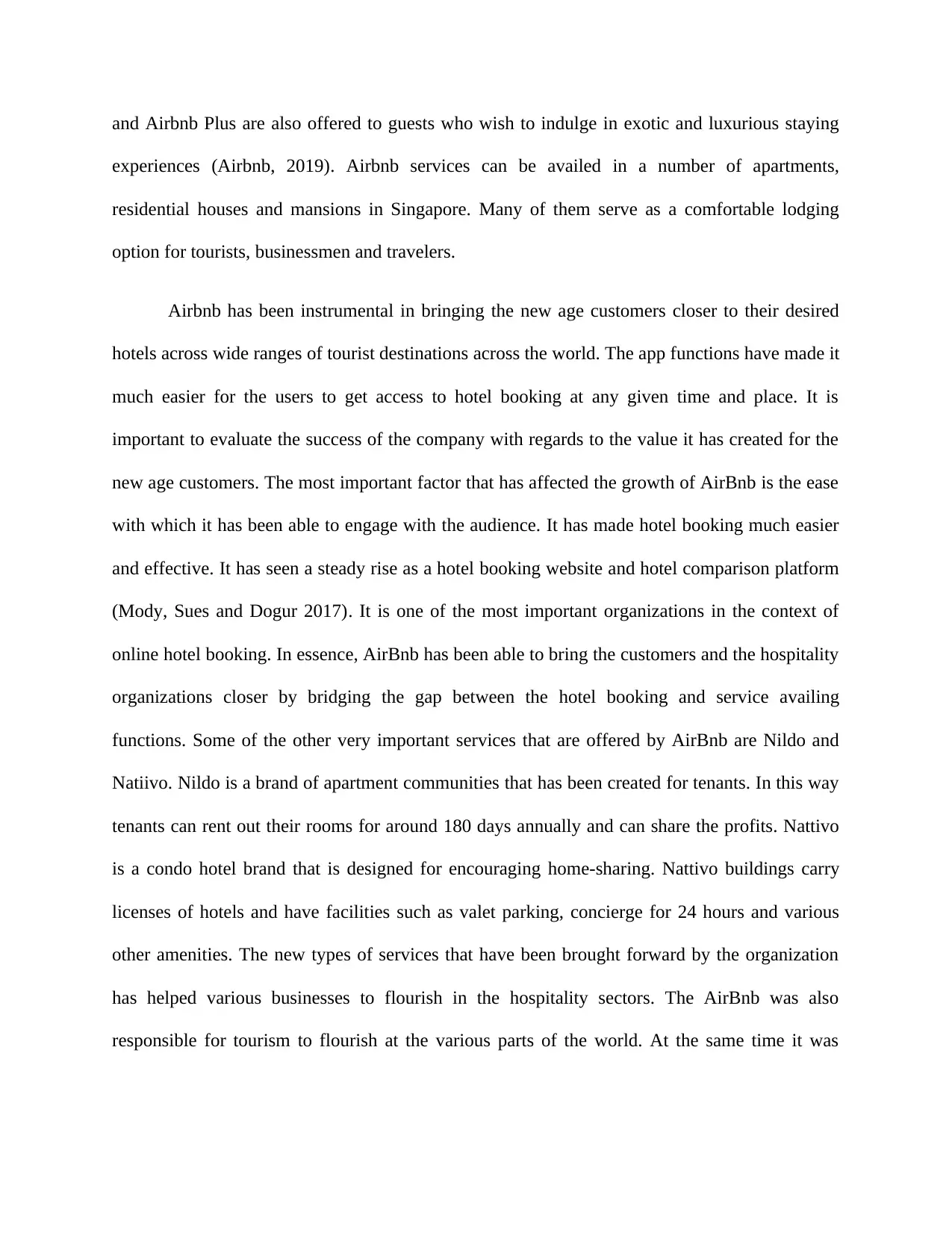
and Airbnb Plus are also offered to guests who wish to indulge in exotic and luxurious staying
experiences (Airbnb, 2019). Airbnb services can be availed in a number of apartments,
residential houses and mansions in Singapore. Many of them serve as a comfortable lodging
option for tourists, businessmen and travelers.
Airbnb has been instrumental in bringing the new age customers closer to their desired
hotels across wide ranges of tourist destinations across the world. The app functions have made it
much easier for the users to get access to hotel booking at any given time and place. It is
important to evaluate the success of the company with regards to the value it has created for the
new age customers. The most important factor that has affected the growth of AirBnb is the ease
with which it has been able to engage with the audience. It has made hotel booking much easier
and effective. It has seen a steady rise as a hotel booking website and hotel comparison platform
(Mody, Sues and Dogur 2017). It is one of the most important organizations in the context of
online hotel booking. In essence, AirBnb has been able to bring the customers and the hospitality
organizations closer by bridging the gap between the hotel booking and service availing
functions. Some of the other very important services that are offered by AirBnb are Nildo and
Natiivo. Nildo is a brand of apartment communities that has been created for tenants. In this way
tenants can rent out their rooms for around 180 days annually and can share the profits. Nattivo
is a condo hotel brand that is designed for encouraging home-sharing. Nattivo buildings carry
licenses of hotels and have facilities such as valet parking, concierge for 24 hours and various
other amenities. The new types of services that have been brought forward by the organization
has helped various businesses to flourish in the hospitality sectors. The AirBnb was also
responsible for tourism to flourish at the various parts of the world. At the same time it was
experiences (Airbnb, 2019). Airbnb services can be availed in a number of apartments,
residential houses and mansions in Singapore. Many of them serve as a comfortable lodging
option for tourists, businessmen and travelers.
Airbnb has been instrumental in bringing the new age customers closer to their desired
hotels across wide ranges of tourist destinations across the world. The app functions have made it
much easier for the users to get access to hotel booking at any given time and place. It is
important to evaluate the success of the company with regards to the value it has created for the
new age customers. The most important factor that has affected the growth of AirBnb is the ease
with which it has been able to engage with the audience. It has made hotel booking much easier
and effective. It has seen a steady rise as a hotel booking website and hotel comparison platform
(Mody, Sues and Dogur 2017). It is one of the most important organizations in the context of
online hotel booking. In essence, AirBnb has been able to bring the customers and the hospitality
organizations closer by bridging the gap between the hotel booking and service availing
functions. Some of the other very important services that are offered by AirBnb are Nildo and
Natiivo. Nildo is a brand of apartment communities that has been created for tenants. In this way
tenants can rent out their rooms for around 180 days annually and can share the profits. Nattivo
is a condo hotel brand that is designed for encouraging home-sharing. Nattivo buildings carry
licenses of hotels and have facilities such as valet parking, concierge for 24 hours and various
other amenities. The new types of services that have been brought forward by the organization
has helped various businesses to flourish in the hospitality sectors. The AirBnb was also
responsible for tourism to flourish at the various parts of the world. At the same time it was
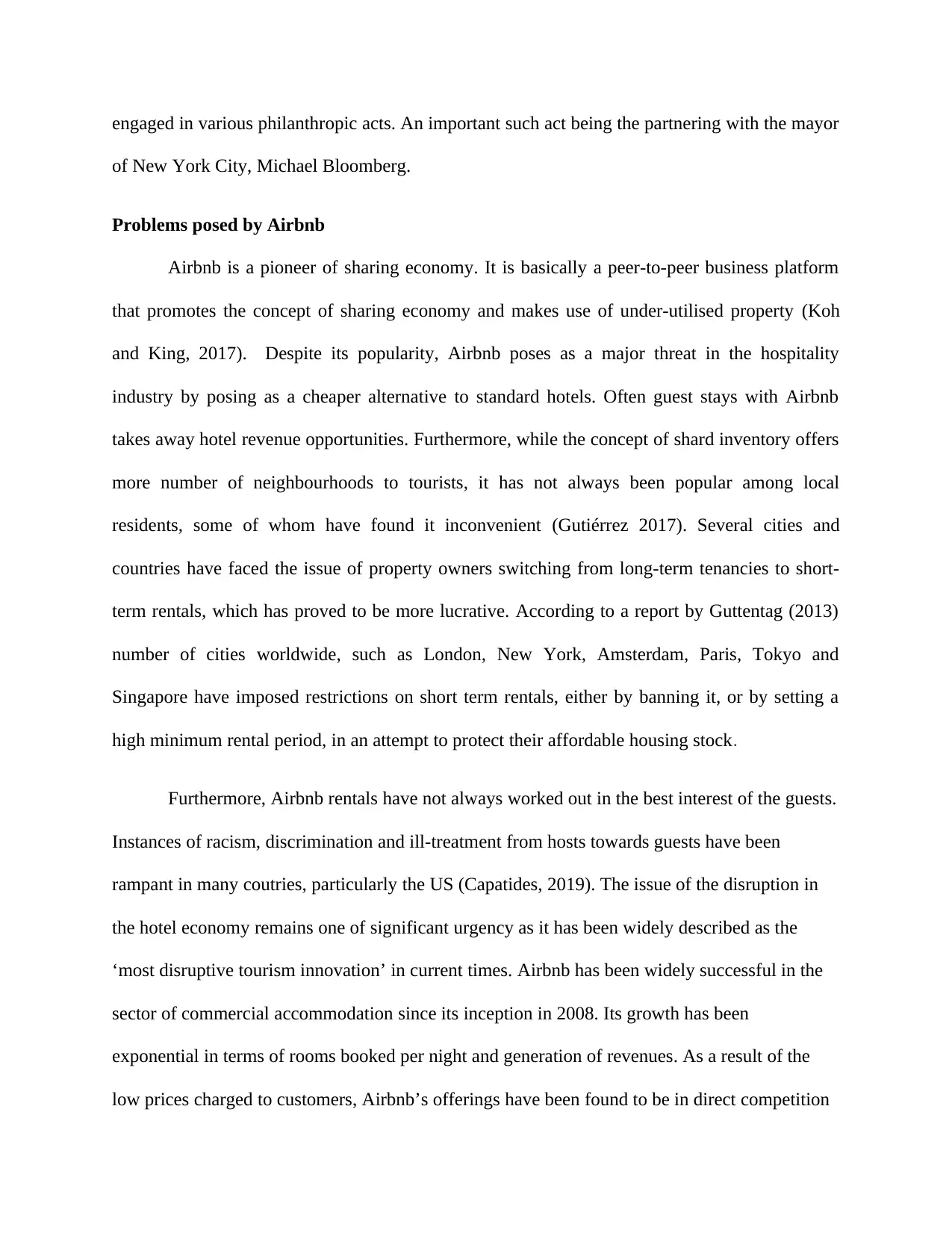
engaged in various philanthropic acts. An important such act being the partnering with the mayor
of New York City, Michael Bloomberg.
Problems posed by Airbnb
Airbnb is a pioneer of sharing economy. It is basically a peer-to-peer business platform
that promotes the concept of sharing economy and makes use of under-utilised property (Koh
and King, 2017). Despite its popularity, Airbnb poses as a major threat in the hospitality
industry by posing as a cheaper alternative to standard hotels. Often guest stays with Airbnb
takes away hotel revenue opportunities. Furthermore, while the concept of shard inventory offers
more number of neighbourhoods to tourists, it has not always been popular among local
residents, some of whom have found it inconvenient (Gutiérrez 2017). Several cities and
countries have faced the issue of property owners switching from long-term tenancies to short-
term rentals, which has proved to be more lucrative. According to a report by Guttentag (2013)
number of cities worldwide, such as London, New York, Amsterdam, Paris, Tokyo and
Singapore have imposed restrictions on short term rentals, either by banning it, or by setting a
high minimum rental period, in an attempt to protect their affordable housing stock.
Furthermore, Airbnb rentals have not always worked out in the best interest of the guests.
Instances of racism, discrimination and ill-treatment from hosts towards guests have been
rampant in many coutries, particularly the US (Capatides, 2019). The issue of the disruption in
the hotel economy remains one of significant urgency as it has been widely described as the
‘most disruptive tourism innovation’ in current times. Airbnb has been widely successful in the
sector of commercial accommodation since its inception in 2008. Its growth has been
exponential in terms of rooms booked per night and generation of revenues. As a result of the
low prices charged to customers, Airbnb’s offerings have been found to be in direct competition
of New York City, Michael Bloomberg.
Problems posed by Airbnb
Airbnb is a pioneer of sharing economy. It is basically a peer-to-peer business platform
that promotes the concept of sharing economy and makes use of under-utilised property (Koh
and King, 2017). Despite its popularity, Airbnb poses as a major threat in the hospitality
industry by posing as a cheaper alternative to standard hotels. Often guest stays with Airbnb
takes away hotel revenue opportunities. Furthermore, while the concept of shard inventory offers
more number of neighbourhoods to tourists, it has not always been popular among local
residents, some of whom have found it inconvenient (Gutiérrez 2017). Several cities and
countries have faced the issue of property owners switching from long-term tenancies to short-
term rentals, which has proved to be more lucrative. According to a report by Guttentag (2013)
number of cities worldwide, such as London, New York, Amsterdam, Paris, Tokyo and
Singapore have imposed restrictions on short term rentals, either by banning it, or by setting a
high minimum rental period, in an attempt to protect their affordable housing stock.
Furthermore, Airbnb rentals have not always worked out in the best interest of the guests.
Instances of racism, discrimination and ill-treatment from hosts towards guests have been
rampant in many coutries, particularly the US (Capatides, 2019). The issue of the disruption in
the hotel economy remains one of significant urgency as it has been widely described as the
‘most disruptive tourism innovation’ in current times. Airbnb has been widely successful in the
sector of commercial accommodation since its inception in 2008. Its growth has been
exponential in terms of rooms booked per night and generation of revenues. As a result of the
low prices charged to customers, Airbnb’s offerings have been found to be in direct competition
⊘ This is a preview!⊘
Do you want full access?
Subscribe today to unlock all pages.

Trusted by 1+ million students worldwide
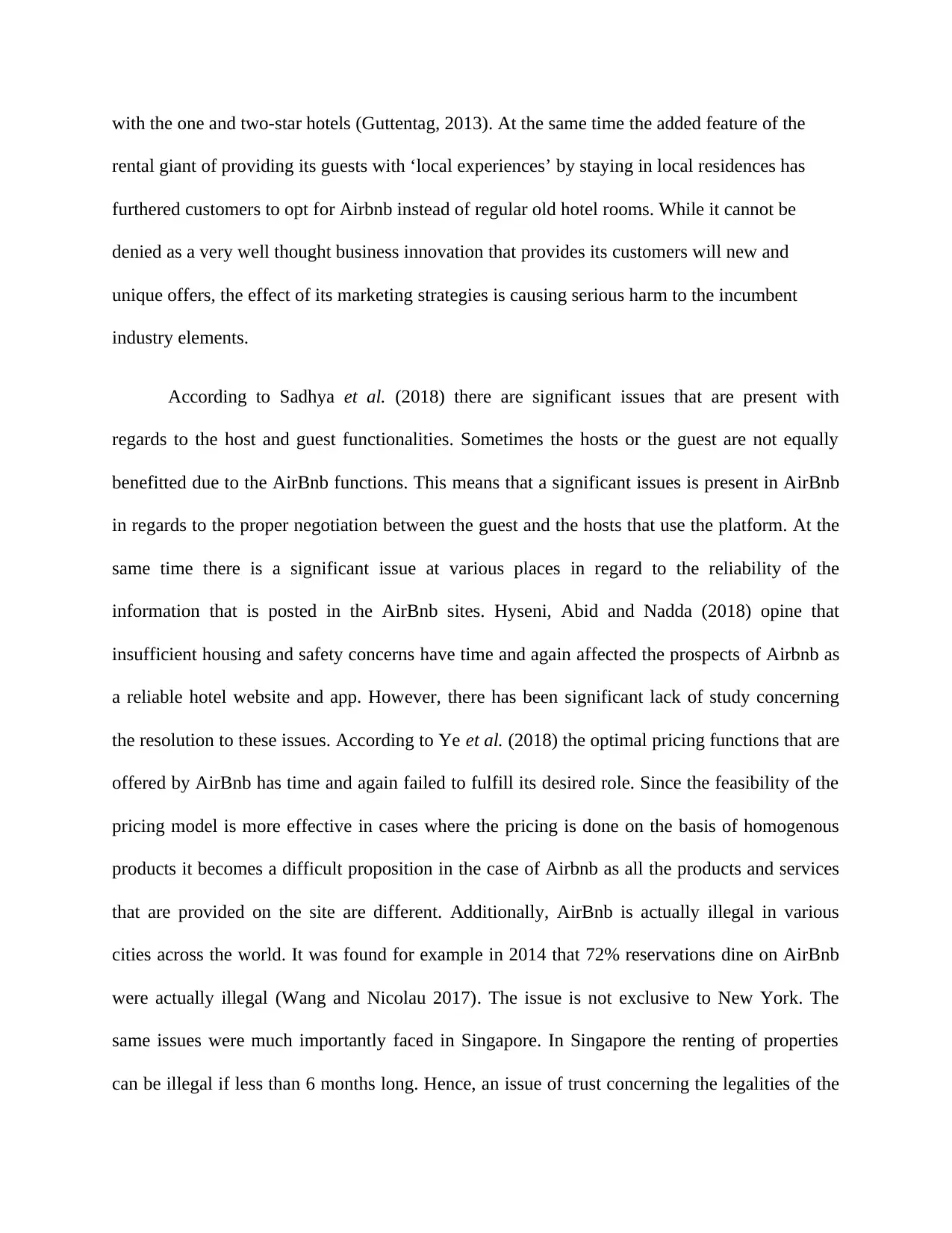
with the one and two-star hotels (Guttentag, 2013). At the same time the added feature of the
rental giant of providing its guests with ‘local experiences’ by staying in local residences has
furthered customers to opt for Airbnb instead of regular old hotel rooms. While it cannot be
denied as a very well thought business innovation that provides its customers will new and
unique offers, the effect of its marketing strategies is causing serious harm to the incumbent
industry elements.
According to Sadhya et al. (2018) there are significant issues that are present with
regards to the host and guest functionalities. Sometimes the hosts or the guest are not equally
benefitted due to the AirBnb functions. This means that a significant issues is present in AirBnb
in regards to the proper negotiation between the guest and the hosts that use the platform. At the
same time there is a significant issue at various places in regard to the reliability of the
information that is posted in the AirBnb sites. Hyseni, Abid and Nadda (2018) opine that
insufficient housing and safety concerns have time and again affected the prospects of Airbnb as
a reliable hotel website and app. However, there has been significant lack of study concerning
the resolution to these issues. According to Ye et al. (2018) the optimal pricing functions that are
offered by AirBnb has time and again failed to fulfill its desired role. Since the feasibility of the
pricing model is more effective in cases where the pricing is done on the basis of homogenous
products it becomes a difficult proposition in the case of Airbnb as all the products and services
that are provided on the site are different. Additionally, AirBnb is actually illegal in various
cities across the world. It was found for example in 2014 that 72% reservations dine on AirBnb
were actually illegal (Wang and Nicolau 2017). The issue is not exclusive to New York. The
same issues were much importantly faced in Singapore. In Singapore the renting of properties
can be illegal if less than 6 months long. Hence, an issue of trust concerning the legalities of the
rental giant of providing its guests with ‘local experiences’ by staying in local residences has
furthered customers to opt for Airbnb instead of regular old hotel rooms. While it cannot be
denied as a very well thought business innovation that provides its customers will new and
unique offers, the effect of its marketing strategies is causing serious harm to the incumbent
industry elements.
According to Sadhya et al. (2018) there are significant issues that are present with
regards to the host and guest functionalities. Sometimes the hosts or the guest are not equally
benefitted due to the AirBnb functions. This means that a significant issues is present in AirBnb
in regards to the proper negotiation between the guest and the hosts that use the platform. At the
same time there is a significant issue at various places in regard to the reliability of the
information that is posted in the AirBnb sites. Hyseni, Abid and Nadda (2018) opine that
insufficient housing and safety concerns have time and again affected the prospects of Airbnb as
a reliable hotel website and app. However, there has been significant lack of study concerning
the resolution to these issues. According to Ye et al. (2018) the optimal pricing functions that are
offered by AirBnb has time and again failed to fulfill its desired role. Since the feasibility of the
pricing model is more effective in cases where the pricing is done on the basis of homogenous
products it becomes a difficult proposition in the case of Airbnb as all the products and services
that are provided on the site are different. Additionally, AirBnb is actually illegal in various
cities across the world. It was found for example in 2014 that 72% reservations dine on AirBnb
were actually illegal (Wang and Nicolau 2017). The issue is not exclusive to New York. The
same issues were much importantly faced in Singapore. In Singapore the renting of properties
can be illegal if less than 6 months long. Hence, an issue of trust concerning the legalities of the
Paraphrase This Document
Need a fresh take? Get an instant paraphrase of this document with our AI Paraphraser
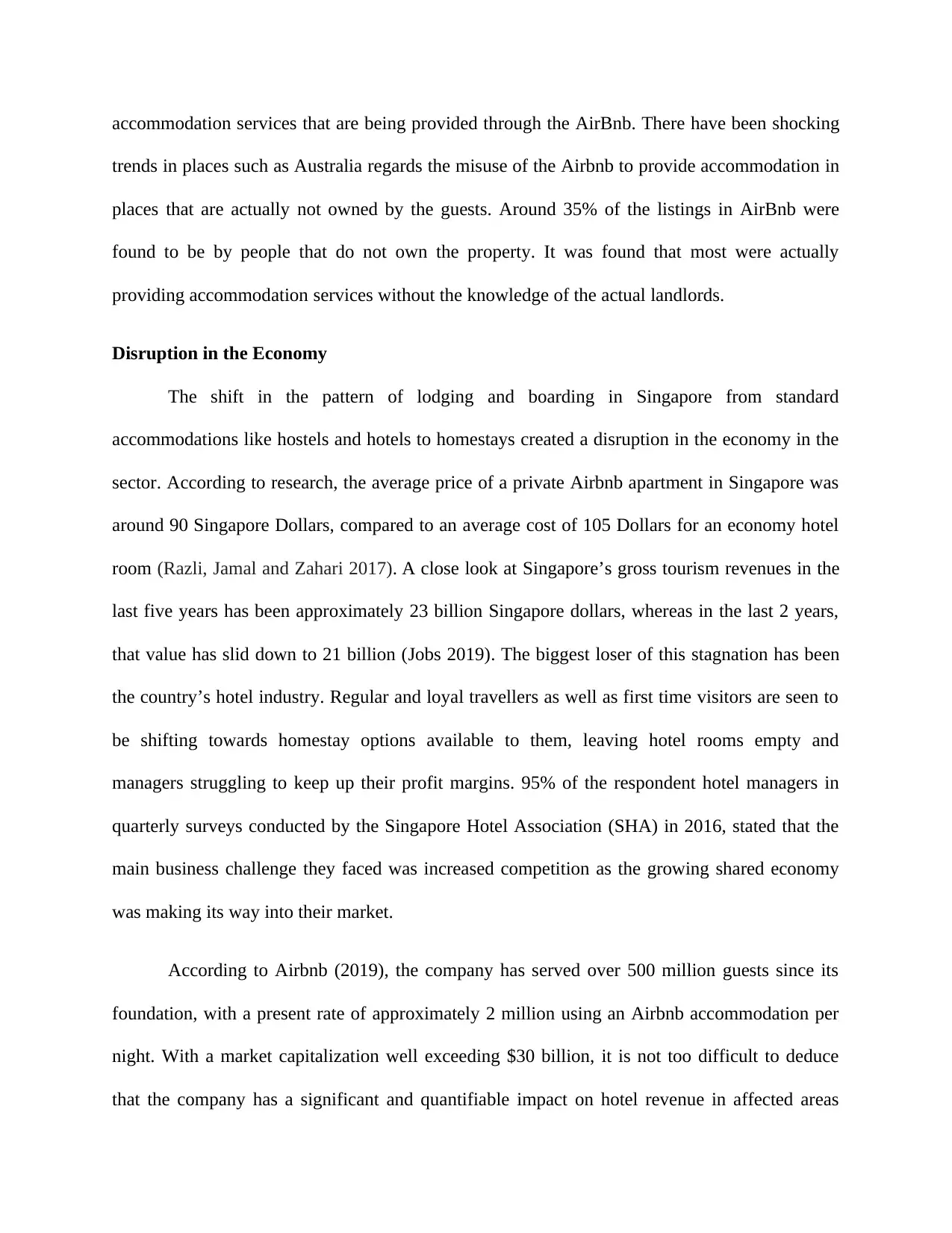
accommodation services that are being provided through the AirBnb. There have been shocking
trends in places such as Australia regards the misuse of the Airbnb to provide accommodation in
places that are actually not owned by the guests. Around 35% of the listings in AirBnb were
found to be by people that do not own the property. It was found that most were actually
providing accommodation services without the knowledge of the actual landlords.
Disruption in the Economy
The shift in the pattern of lodging and boarding in Singapore from standard
accommodations like hostels and hotels to homestays created a disruption in the economy in the
sector. According to research, the average price of a private Airbnb apartment in Singapore was
around 90 Singapore Dollars, compared to an average cost of 105 Dollars for an economy hotel
room (Razli, Jamal and Zahari 2017). A close look at Singapore’s gross tourism revenues in the
last five years has been approximately 23 billion Singapore dollars, whereas in the last 2 years,
that value has slid down to 21 billion (Jobs 2019). The biggest loser of this stagnation has been
the country’s hotel industry. Regular and loyal travellers as well as first time visitors are seen to
be shifting towards homestay options available to them, leaving hotel rooms empty and
managers struggling to keep up their profit margins. 95% of the respondent hotel managers in
quarterly surveys conducted by the Singapore Hotel Association (SHA) in 2016, stated that the
main business challenge they faced was increased competition as the growing shared economy
was making its way into their market.
According to Airbnb (2019), the company has served over 500 million guests since its
foundation, with a present rate of approximately 2 million using an Airbnb accommodation per
night. With a market capitalization well exceeding $30 billion, it is not too difficult to deduce
that the company has a significant and quantifiable impact on hotel revenue in affected areas
trends in places such as Australia regards the misuse of the Airbnb to provide accommodation in
places that are actually not owned by the guests. Around 35% of the listings in AirBnb were
found to be by people that do not own the property. It was found that most were actually
providing accommodation services without the knowledge of the actual landlords.
Disruption in the Economy
The shift in the pattern of lodging and boarding in Singapore from standard
accommodations like hostels and hotels to homestays created a disruption in the economy in the
sector. According to research, the average price of a private Airbnb apartment in Singapore was
around 90 Singapore Dollars, compared to an average cost of 105 Dollars for an economy hotel
room (Razli, Jamal and Zahari 2017). A close look at Singapore’s gross tourism revenues in the
last five years has been approximately 23 billion Singapore dollars, whereas in the last 2 years,
that value has slid down to 21 billion (Jobs 2019). The biggest loser of this stagnation has been
the country’s hotel industry. Regular and loyal travellers as well as first time visitors are seen to
be shifting towards homestay options available to them, leaving hotel rooms empty and
managers struggling to keep up their profit margins. 95% of the respondent hotel managers in
quarterly surveys conducted by the Singapore Hotel Association (SHA) in 2016, stated that the
main business challenge they faced was increased competition as the growing shared economy
was making its way into their market.
According to Airbnb (2019), the company has served over 500 million guests since its
foundation, with a present rate of approximately 2 million using an Airbnb accommodation per
night. With a market capitalization well exceeding $30 billion, it is not too difficult to deduce
that the company has a significant and quantifiable impact on hotel revenue in affected areas
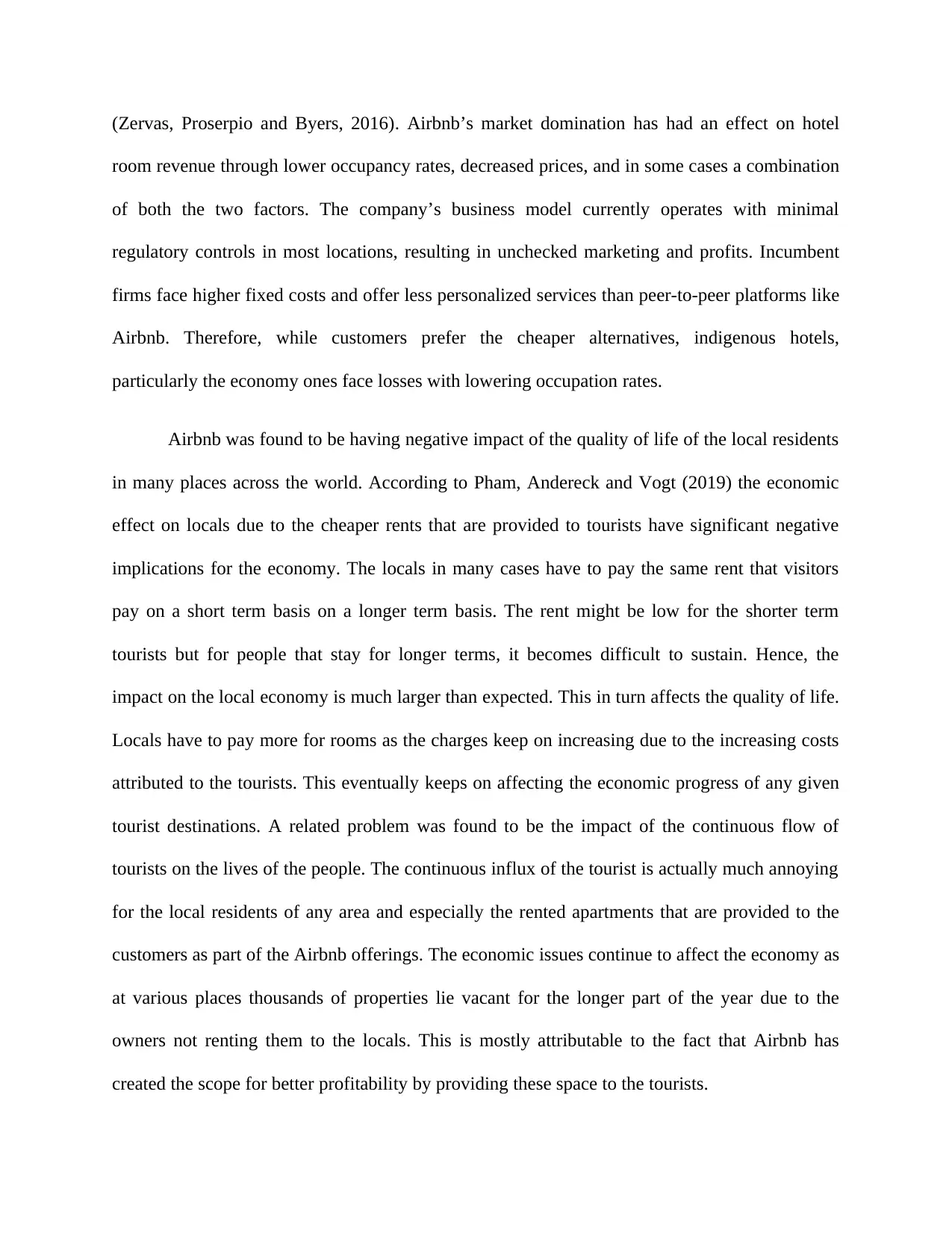
(Zervas, Proserpio and Byers, 2016). Airbnb’s market domination has had an effect on hotel
room revenue through lower occupancy rates, decreased prices, and in some cases a combination
of both the two factors. The company’s business model currently operates with minimal
regulatory controls in most locations, resulting in unchecked marketing and profits. Incumbent
firms face higher fixed costs and offer less personalized services than peer-to-peer platforms like
Airbnb. Therefore, while customers prefer the cheaper alternatives, indigenous hotels,
particularly the economy ones face losses with lowering occupation rates.
Airbnb was found to be having negative impact of the quality of life of the local residents
in many places across the world. According to Pham, Andereck and Vogt (2019) the economic
effect on locals due to the cheaper rents that are provided to tourists have significant negative
implications for the economy. The locals in many cases have to pay the same rent that visitors
pay on a short term basis on a longer term basis. The rent might be low for the shorter term
tourists but for people that stay for longer terms, it becomes difficult to sustain. Hence, the
impact on the local economy is much larger than expected. This in turn affects the quality of life.
Locals have to pay more for rooms as the charges keep on increasing due to the increasing costs
attributed to the tourists. This eventually keeps on affecting the economic progress of any given
tourist destinations. A related problem was found to be the impact of the continuous flow of
tourists on the lives of the people. The continuous influx of the tourist is actually much annoying
for the local residents of any area and especially the rented apartments that are provided to the
customers as part of the Airbnb offerings. The economic issues continue to affect the economy as
at various places thousands of properties lie vacant for the longer part of the year due to the
owners not renting them to the locals. This is mostly attributable to the fact that Airbnb has
created the scope for better profitability by providing these space to the tourists.
room revenue through lower occupancy rates, decreased prices, and in some cases a combination
of both the two factors. The company’s business model currently operates with minimal
regulatory controls in most locations, resulting in unchecked marketing and profits. Incumbent
firms face higher fixed costs and offer less personalized services than peer-to-peer platforms like
Airbnb. Therefore, while customers prefer the cheaper alternatives, indigenous hotels,
particularly the economy ones face losses with lowering occupation rates.
Airbnb was found to be having negative impact of the quality of life of the local residents
in many places across the world. According to Pham, Andereck and Vogt (2019) the economic
effect on locals due to the cheaper rents that are provided to tourists have significant negative
implications for the economy. The locals in many cases have to pay the same rent that visitors
pay on a short term basis on a longer term basis. The rent might be low for the shorter term
tourists but for people that stay for longer terms, it becomes difficult to sustain. Hence, the
impact on the local economy is much larger than expected. This in turn affects the quality of life.
Locals have to pay more for rooms as the charges keep on increasing due to the increasing costs
attributed to the tourists. This eventually keeps on affecting the economic progress of any given
tourist destinations. A related problem was found to be the impact of the continuous flow of
tourists on the lives of the people. The continuous influx of the tourist is actually much annoying
for the local residents of any area and especially the rented apartments that are provided to the
customers as part of the Airbnb offerings. The economic issues continue to affect the economy as
at various places thousands of properties lie vacant for the longer part of the year due to the
owners not renting them to the locals. This is mostly attributable to the fact that Airbnb has
created the scope for better profitability by providing these space to the tourists.
⊘ This is a preview!⊘
Do you want full access?
Subscribe today to unlock all pages.

Trusted by 1+ million students worldwide
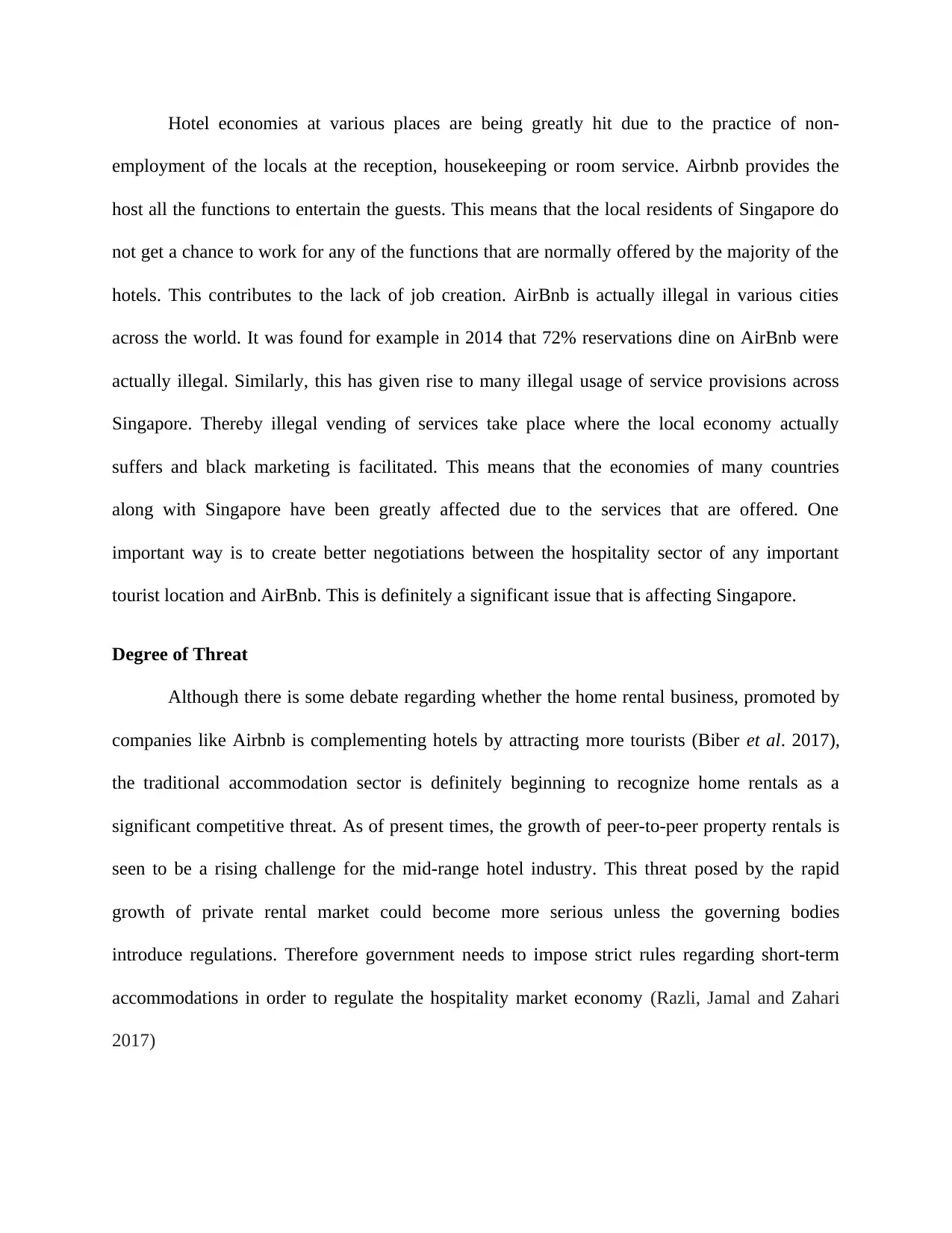
Hotel economies at various places are being greatly hit due to the practice of non-
employment of the locals at the reception, housekeeping or room service. Airbnb provides the
host all the functions to entertain the guests. This means that the local residents of Singapore do
not get a chance to work for any of the functions that are normally offered by the majority of the
hotels. This contributes to the lack of job creation. AirBnb is actually illegal in various cities
across the world. It was found for example in 2014 that 72% reservations dine on AirBnb were
actually illegal. Similarly, this has given rise to many illegal usage of service provisions across
Singapore. Thereby illegal vending of services take place where the local economy actually
suffers and black marketing is facilitated. This means that the economies of many countries
along with Singapore have been greatly affected due to the services that are offered. One
important way is to create better negotiations between the hospitality sector of any important
tourist location and AirBnb. This is definitely a significant issue that is affecting Singapore.
Degree of Threat
Although there is some debate regarding whether the home rental business, promoted by
companies like Airbnb is complementing hotels by attracting more tourists (Biber et al. 2017),
the traditional accommodation sector is definitely beginning to recognize home rentals as a
significant competitive threat. As of present times, the growth of peer-to-peer property rentals is
seen to be a rising challenge for the mid-range hotel industry. This threat posed by the rapid
growth of private rental market could become more serious unless the governing bodies
introduce regulations. Therefore government needs to impose strict rules regarding short-term
accommodations in order to regulate the hospitality market economy (Razli, Jamal and Zahari
2017)
employment of the locals at the reception, housekeeping or room service. Airbnb provides the
host all the functions to entertain the guests. This means that the local residents of Singapore do
not get a chance to work for any of the functions that are normally offered by the majority of the
hotels. This contributes to the lack of job creation. AirBnb is actually illegal in various cities
across the world. It was found for example in 2014 that 72% reservations dine on AirBnb were
actually illegal. Similarly, this has given rise to many illegal usage of service provisions across
Singapore. Thereby illegal vending of services take place where the local economy actually
suffers and black marketing is facilitated. This means that the economies of many countries
along with Singapore have been greatly affected due to the services that are offered. One
important way is to create better negotiations between the hospitality sector of any important
tourist location and AirBnb. This is definitely a significant issue that is affecting Singapore.
Degree of Threat
Although there is some debate regarding whether the home rental business, promoted by
companies like Airbnb is complementing hotels by attracting more tourists (Biber et al. 2017),
the traditional accommodation sector is definitely beginning to recognize home rentals as a
significant competitive threat. As of present times, the growth of peer-to-peer property rentals is
seen to be a rising challenge for the mid-range hotel industry. This threat posed by the rapid
growth of private rental market could become more serious unless the governing bodies
introduce regulations. Therefore government needs to impose strict rules regarding short-term
accommodations in order to regulate the hospitality market economy (Razli, Jamal and Zahari
2017)
Paraphrase This Document
Need a fresh take? Get an instant paraphrase of this document with our AI Paraphraser
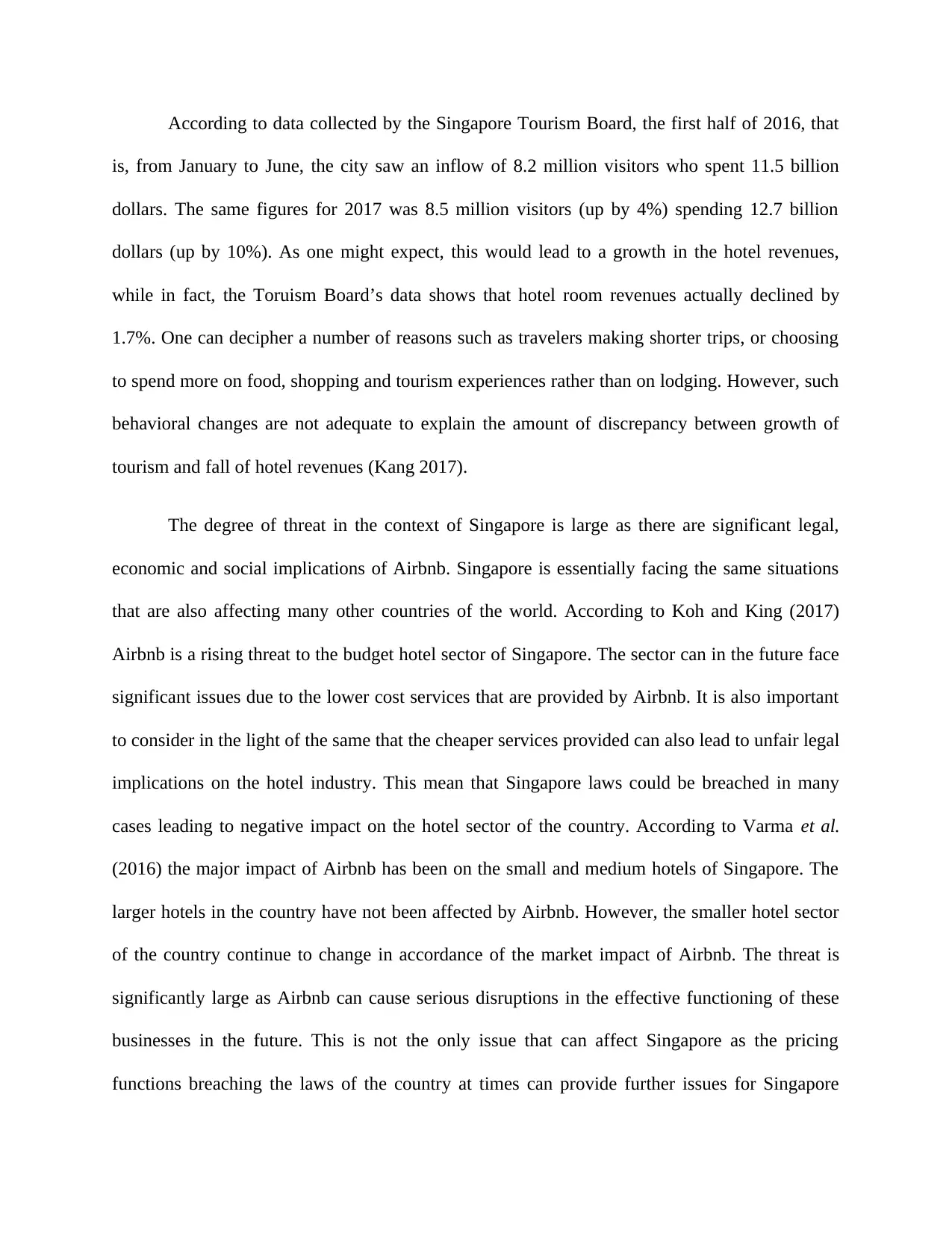
According to data collected by the Singapore Tourism Board, the first half of 2016, that
is, from January to June, the city saw an inflow of 8.2 million visitors who spent 11.5 billion
dollars. The same figures for 2017 was 8.5 million visitors (up by 4%) spending 12.7 billion
dollars (up by 10%). As one might expect, this would lead to a growth in the hotel revenues,
while in fact, the Toruism Board’s data shows that hotel room revenues actually declined by
1.7%. One can decipher a number of reasons such as travelers making shorter trips, or choosing
to spend more on food, shopping and tourism experiences rather than on lodging. However, such
behavioral changes are not adequate to explain the amount of discrepancy between growth of
tourism and fall of hotel revenues (Kang 2017).
The degree of threat in the context of Singapore is large as there are significant legal,
economic and social implications of Airbnb. Singapore is essentially facing the same situations
that are also affecting many other countries of the world. According to Koh and King (2017)
Airbnb is a rising threat to the budget hotel sector of Singapore. The sector can in the future face
significant issues due to the lower cost services that are provided by Airbnb. It is also important
to consider in the light of the same that the cheaper services provided can also lead to unfair legal
implications on the hotel industry. This mean that Singapore laws could be breached in many
cases leading to negative impact on the hotel sector of the country. According to Varma et al.
(2016) the major impact of Airbnb has been on the small and medium hotels of Singapore. The
larger hotels in the country have not been affected by Airbnb. However, the smaller hotel sector
of the country continue to change in accordance of the market impact of Airbnb. The threat is
significantly large as Airbnb can cause serious disruptions in the effective functioning of these
businesses in the future. This is not the only issue that can affect Singapore as the pricing
functions breaching the laws of the country at times can provide further issues for Singapore
is, from January to June, the city saw an inflow of 8.2 million visitors who spent 11.5 billion
dollars. The same figures for 2017 was 8.5 million visitors (up by 4%) spending 12.7 billion
dollars (up by 10%). As one might expect, this would lead to a growth in the hotel revenues,
while in fact, the Toruism Board’s data shows that hotel room revenues actually declined by
1.7%. One can decipher a number of reasons such as travelers making shorter trips, or choosing
to spend more on food, shopping and tourism experiences rather than on lodging. However, such
behavioral changes are not adequate to explain the amount of discrepancy between growth of
tourism and fall of hotel revenues (Kang 2017).
The degree of threat in the context of Singapore is large as there are significant legal,
economic and social implications of Airbnb. Singapore is essentially facing the same situations
that are also affecting many other countries of the world. According to Koh and King (2017)
Airbnb is a rising threat to the budget hotel sector of Singapore. The sector can in the future face
significant issues due to the lower cost services that are provided by Airbnb. It is also important
to consider in the light of the same that the cheaper services provided can also lead to unfair legal
implications on the hotel industry. This mean that Singapore laws could be breached in many
cases leading to negative impact on the hotel sector of the country. According to Varma et al.
(2016) the major impact of Airbnb has been on the small and medium hotels of Singapore. The
larger hotels in the country have not been affected by Airbnb. However, the smaller hotel sector
of the country continue to change in accordance of the market impact of Airbnb. The threat is
significantly large as Airbnb can cause serious disruptions in the effective functioning of these
businesses in the future. This is not the only issue that can affect Singapore as the pricing
functions breaching the laws of the country at times can provide further issues for Singapore
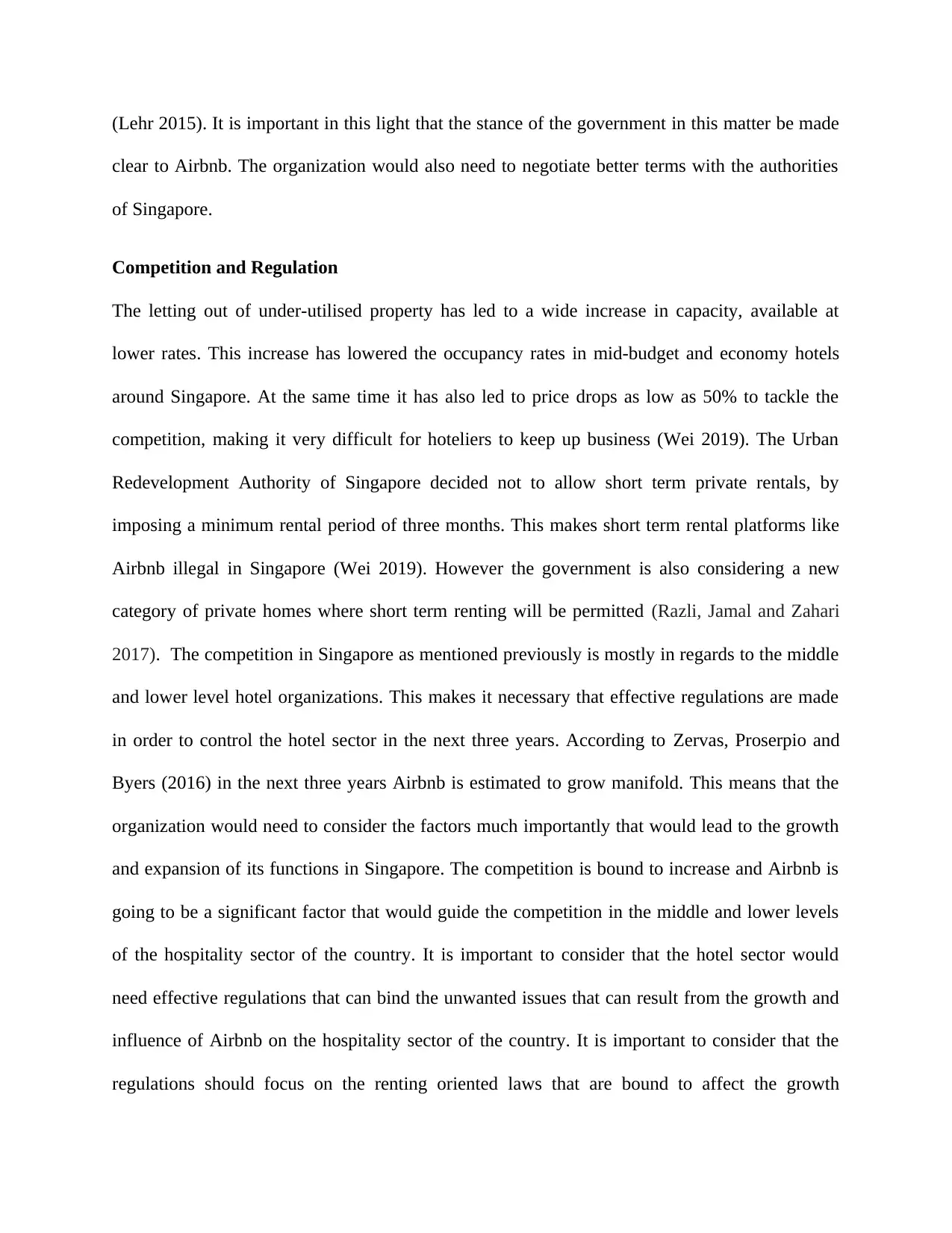
(Lehr 2015). It is important in this light that the stance of the government in this matter be made
clear to Airbnb. The organization would also need to negotiate better terms with the authorities
of Singapore.
Competition and Regulation
The letting out of under-utilised property has led to a wide increase in capacity, available at
lower rates. This increase has lowered the occupancy rates in mid-budget and economy hotels
around Singapore. At the same time it has also led to price drops as low as 50% to tackle the
competition, making it very difficult for hoteliers to keep up business (Wei 2019). The Urban
Redevelopment Authority of Singapore decided not to allow short term private rentals, by
imposing a minimum rental period of three months. This makes short term rental platforms like
Airbnb illegal in Singapore (Wei 2019). However the government is also considering a new
category of private homes where short term renting will be permitted (Razli, Jamal and Zahari
2017). The competition in Singapore as mentioned previously is mostly in regards to the middle
and lower level hotel organizations. This makes it necessary that effective regulations are made
in order to control the hotel sector in the next three years. According to Zervas, Proserpio and
Byers (2016) in the next three years Airbnb is estimated to grow manifold. This means that the
organization would need to consider the factors much importantly that would lead to the growth
and expansion of its functions in Singapore. The competition is bound to increase and Airbnb is
going to be a significant factor that would guide the competition in the middle and lower levels
of the hospitality sector of the country. It is important to consider that the hotel sector would
need effective regulations that can bind the unwanted issues that can result from the growth and
influence of Airbnb on the hospitality sector of the country. It is important to consider that the
regulations should focus on the renting oriented laws that are bound to affect the growth
clear to Airbnb. The organization would also need to negotiate better terms with the authorities
of Singapore.
Competition and Regulation
The letting out of under-utilised property has led to a wide increase in capacity, available at
lower rates. This increase has lowered the occupancy rates in mid-budget and economy hotels
around Singapore. At the same time it has also led to price drops as low as 50% to tackle the
competition, making it very difficult for hoteliers to keep up business (Wei 2019). The Urban
Redevelopment Authority of Singapore decided not to allow short term private rentals, by
imposing a minimum rental period of three months. This makes short term rental platforms like
Airbnb illegal in Singapore (Wei 2019). However the government is also considering a new
category of private homes where short term renting will be permitted (Razli, Jamal and Zahari
2017). The competition in Singapore as mentioned previously is mostly in regards to the middle
and lower level hotel organizations. This makes it necessary that effective regulations are made
in order to control the hotel sector in the next three years. According to Zervas, Proserpio and
Byers (2016) in the next three years Airbnb is estimated to grow manifold. This means that the
organization would need to consider the factors much importantly that would lead to the growth
and expansion of its functions in Singapore. The competition is bound to increase and Airbnb is
going to be a significant factor that would guide the competition in the middle and lower levels
of the hospitality sector of the country. It is important to consider that the hotel sector would
need effective regulations that can bind the unwanted issues that can result from the growth and
influence of Airbnb on the hospitality sector of the country. It is important to consider that the
regulations should focus on the renting oriented laws that are bound to affect the growth
⊘ This is a preview!⊘
Do you want full access?
Subscribe today to unlock all pages.

Trusted by 1+ million students worldwide
1 out of 17
Related Documents
Your All-in-One AI-Powered Toolkit for Academic Success.
+13062052269
info@desklib.com
Available 24*7 on WhatsApp / Email
![[object Object]](/_next/static/media/star-bottom.7253800d.svg)
Unlock your academic potential
Copyright © 2020–2026 A2Z Services. All Rights Reserved. Developed and managed by ZUCOL.




![Managing Accommodation Services: LO1 Report, [University Name]](/_next/image/?url=https%3A%2F%2Fdesklib.com%2Fmedia%2Fimages%2Fnk%2F5305ca6f8ca5407baa9107a72849f4c6.jpg&w=256&q=75)
